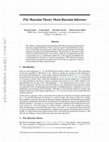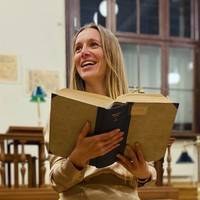Papers by Eleonora Lombardo
Sermoni antiereticali del frate Predicatore Pietro Hispani nella Linguadoca della seconda metà del XIII secolo. Un corpus sconosciuto.
Revue Mabillon, 2023
Revue Mabillon, n.s. t. 34 (=95), 2023, pp. 73-138

La prédication des franciscains à l’universitè de Paris dans la première moitiè du XIIIe siècle. Quatre sermons d’Alexandre d’Halès, OMin (1238-1245), «Bibliothèque de l’École de Chartes», 178 (2022), pp. 465-505
Bibliothèque de l'Ecole des Chartes, 2022
L’arrivée des frères mineurs à Paris marqua un tournant décisif dans la formation de l’Ordre, car... more L’arrivée des frères mineurs à Paris marqua un tournant décisif dans la formation de l’Ordre, car elle mit ses membres en contact avec la vie culturelle très vivante de l’université dans cette ville, et avec la faculté de théologie. Les frères se trouvèrent ainsi amenés à prêcher sous une forme inhabituelle à un public déjà habitué à la nouvelle forme de théologie pastorale élaborée précisément dans cette ville. Mais ils réussirent bientôt à convertir à leur ordre de nombreux étudiants et personnalités, comme le maître de théologie en charge, Alexandre de Halès. Ce dernier se trouva donc en position de prêcher, en maître, à ceux qui avaient été ses élèves, et en même temps à des frères curieux de comprendre les techniques et les messages les plus efficaces pour leurs campagnes pastorales. Les sermons analysés dans cet article, les seuls à ce jour attribués au doctor irrefragabilis, sont donc un témoignage précieux de la transformation de l’Ordre à cette époque et des rapports avec l’université de Paris.

《Optans fore socius glorie victorum》. La vocazione martiriale di sant'Antonio di Padova nei sermoni medievali
Cristianesimo nella storia, 2022
The desire for martyrdom has characterised Christianity from its earliest times. The Order of Fri... more The desire for martyrdom has characterised Christianity from its earliest times. The Order of Friars Minor was invested with it from its origins, but had an uneasy relationship with it due to the need to control the excesses of its members and to offer them alternative examples of holiness. Hagiographic legends and sermons dedicated to the saints of the Order, in particular to Saint Anthony of Padua, bear witness to these elaborations. The article examines both types of sources, primarily focusing on sermons dedicated to Saint Anthony in the period between his canonisation and the mid-14th century. It discusses the different reasons that led the preachers to exalt either the inspiring example of the proto-martyrs or the alternative to seeking martyrdom, and, finally, a second motivation for Anthony’s entry into the Order, that is poverty. The latter reason, however, was motivated only after the discovery of the story of the five martyrs of Morocco.

We exhibit a strong link between frequentist PAC-Bayesian risk bounds and the Bayesian marginal l... more We exhibit a strong link between frequentist PAC-Bayesian risk bounds and the Bayesian marginal likelihood. That is, for the negative log-likelihood loss function, we show that the minimization of PAC-Bayesian generalization risk bounds maximizes the Bayesian marginal likelihood. This provides an alternative explanation to the Bayesian Occam's razor criteria, under the assumption that the data is generated by an i.i.d. distribution. Moreover, as the negative log-likelihood is an unbounded loss function, we motivate and propose a PAC-Bayesian theorem tailored for the sub-gamma loss family, and we show that our approach is sound on classical Bayesian linear regression tasks. We denote the learning sample (X, Y )={(x i , y i )} n i=1 ∈(X ×Y) n , that contains n input-output pairs. The main assumption of frequentist learning theories-including PAC-Bayes-is that (X, Y ) is 1 Some existing connections are discussed in Appendix A.1.

Medieval Sermon Studies, 2012
One of the main reasons for Saint Anthony of Padua's holy fame and reputation is his activity as ... more One of the main reasons for Saint Anthony of Padua's holy fame and reputation is his activity as a preacher. This article begins v^/ith a review of the hagiographical legends referring to preaching as a virtue or gift of divine grace, and the importance of lulianus of Speyer's works in spreading the concept of preaching as a virtue is hightlighted. Then follows a discussion of a series of texts written between about 1250 and 1350, which seeks to shed light on the identification of recta et fructuosa praedicatio (right and fruitful preaching activity) with Anthony's wisdom {sapientia) or knowledge (scientia). It can be seen that this message was expounded over a relatively broad timespan from the 1280s onwards. There is also evidence of an interdisciplinary problem, which seems to involve not only the preachers belonging to the Order of Friars Minor, but also those who were called to preach to them from outside the Order itself. Three possible reasons for the appearance of preaching on the list of virtues are suggested. It may have originated from the attempt to assimilate contemporary preachers with the model of holiness provided by Anthony or from an effort to create a counterbalance to the vices of the tongue that were supposed to plague the preachers' audiences. It may also be an indicator of a more general debate on praedicatio as a gift of divine grace in opposition to those who believed it was merely the result of a studied technique. Cet article a été présente, sous forme d'une intervention de courte durée, pendant le congres international 'Fides Virtus. The Virtue of Faith in the Context of the Theologieal Virtues, Fxegesis, Moral Theology, and Pastoral Care from Twelfth to Early Sixteenth Century' (Padoue, 6-9 juillet 2011). II fait partie d'un projet de postdoetorat intitulé 'Sermons on Saint Anthony of Lisbon: Between Flagiography and Orality (about 1232-1350)' et financé par la Fundaçâo para C'iêneia e Tecnologia de Lisbonne (SFRH/BPD/70408/2P10). Les institutions concernées par le déroulement du projet sont le

Varia Historia, 2015
Resumo Este artigo apresenta uma pequena e quase ignorada coleção de sermões oriundos da Itália s... more Resumo Este artigo apresenta uma pequena e quase ignorada coleção de sermões oriundos da Itália setentrional. Eles foram escritos por um frade franciscano chamado Sovramonte de Varese (Supermons de Varisio), por volta da metade do século XIII. Tais sermões são úteis para entender as dinâmicas entre a apresentação oral do sermão e a sua escrita. Após uma detalhada reconstrução da biografia de Sovramonte, o artigo apresenta a coleção priorizando dois temas: a usura e a heresia. Ambos permitem-nos recuperar a ação do frade no contexto urbano supostamente de Milão. Tentar-se-à introduzir a questão das relações desta coleção com obras contemporâneas, como os sermões de Felipe o Chanceler e Santo Antônio de Pádua, para esclarecer as passagens que aparecem subentendidas em todo o trabalho de Sovramonte: a leitura, a pregação e a escrita. Palavras-chave Supermons de Varisio, sermões medievais, pregação, ordem franciscana, usura, heresia.

Ecclesia huius temporis. La Chiesa militante nelle prime raccolte dei sermoni dei frati minori (1225ca - 1260)
The thesis, concerning the ideas of the Church, meant as an assembly of people with different deg... more The thesis, concerning the ideas of the Church, meant as an assembly of people with different degrees of responsability, deals with a section of two chapters about the structures assumed by Franciscan model sermon collections before 1260. The different ways they use to write their sermons is focused to underline how sermon structuring is just another way to approach Sacred Scripture and all problems having a basis on it, in our case the Church. The period chosen for this study also shows the fact that earlier franciscan generations do not introduce a new methodology nor in exegesis neither in sermon composition, as they use all their former education to introduce the new way of life in which they have become a part only after having finished their studies. At the end of the section it’s clear that for these friars there’s not a central or common way to use sermons to explain the concept of the Church, as their first approach to it is based on their attention to the public and to the...
I sermones de sancto Antonio tra XIII e XIV secolo. Status quaestionis ed edizione del sermone Venezia, Lat. Z, 158 (1779), ff. 120v-122v
La production homilétique franciscaine. Quelques considerations pour un approche structural aux premières recueils des sermons des fréres mineurs
Parlare di sant'Antonio al capitolo generale del 1310. Le due versioni del sermone "Accessistis ad montem Syon" nei manoscritti Vaticano, Biblioteca Apostolica Vaticana, Borgh. 80, ff. 123v-125r e Todi, Biblioteca Comunale L. Leonii, ms. 126, ff. 101ra-103rb
Sant'Antonio nella devozione della fine del Medioevo. I sermoni per il 13 giugno
Itinerarium, 63 (2017), pp. 159-174.
The development of devotion to Saint Anthony of Padua/Lisbon between localism and universalism
Presentation of the book: L. Pellegrini, I luoghi di frate Francesco. Memoria agiografica e realtà storica, Milano, Edizioni Biblioteca Francescana, 2010. Questioni di metodo: discussione sul libro
Models of Virtues.: The role of virtues in sermons and hagiography for new saints' cult (XIII - XV cent.)
Review to ALEKSANDER HOROWSKI, Repertorium sermonum latinorum medii aevi ad laudem sancti Francisci Assisiensis (Subsidia scientifica franciscalia, 13), Istituto Storico dei Cappuccini, Roma 2013
Le bonne usage de la prédication comme "vertue" dans le sermons sur saint Antoine de Padoue" (Padova, 6-9 Luglio 2011)
Review to Jean de Mailly, Abbreviatio in gestis et miraculis sanctorum. Supplementum hagiographicum. Editio princeps (Millennio Medievale 97. Testi 21), a cura di Giovanni Paolo Maggioni, Sismel - Edizioni del Galluzzo, Firenze 2013
Review to Stanislava Kuzmova, Preaching Saint Stanislaus. Medieval Sermons on Saint Stanislaus of Cracow, HIs Image and Cult, DiG, Warsaw 2013
Review to LORENZA TROMBONI, (a cura di), Inter omnes Plato et Aristoteles: gli appunti filosofici di Girolamo Savonarola,Fédération Internationale des Instituts d'Études Médiévales. Textes et études du Moyen Âge, 66, Brepols, Porto, 2012, «Medieval Sermon Studies»
Sermons on Saint Anthony of Lisbon: between hagiography and orality (about 1232-1350). Status quaestionis and new perspectives











Uploads
Papers by Eleonora Lombardo
O seminário vai propor uma apresentação das mutações da figura de santo António nas lendas hagiográficas e sobretudo nos sermões, com algumas referências as imagens. A primeira parte vai apresentar o santo como estava narrado durante os séculos XIII e XIV, quando a sua figura estava mais ligada a devoção culta e mais interna a Ordem dos frades menores. A segunda parte vai propor reflexões sobre a ultima parte da Idade Media, quando Santo António se tornou no santo popular e dos milagres graças sobretudo a incidência dos grandes pregadores da Observância franciscana.
Even if "Francisci emulus", Anthony's perfection arrives as the end of a process chosen by the saint growing in a selected group of virtues.
Moving from the usual catalogue of virtues, not all of them pertain to saint Anthony. Preachers and hagiographers, infact, focus basically on a small selection: humility, poverty, charity and, above all, wisdom in both its meanings of "doctrina" and "scientia". Having a deeper look to the two groups of sources, however, it's clear that some topics pertain mostly to preachers. Although trying to introduce new lectures of saint Anthony's figure as it was elaborated by preachers, hagiographers do not stress them as much as preachers do.
Having a deeper look to virtues, it's clear that Anthony acts in perfect charity, but this virtue is not often recalled either in hagiography either in preaching.
Both to preachers and hagiographers three virtues dominated Anthony's experience and guided him to holiness: wisdom, humility and poverty.
Wisdom is essentially the saint's main virtue and writers realaborate it several times, to give it both meanings of knowledge and preaching. According to an Order more and more involved in theological debates and academical controversies, however, at the beginning of the XIV century the episodes connected to contemplation as a part of Anthony's gaining wisdom, are gradually reduced in space and importance in lives, while mainly disappear in sermons in favour of his being a preacher.
Another important change is made when medieval authors wrote about humility. More important in hagiography than in sermons, this virtue is treated as a bridge, and it can be related both to wisdom and to poverty. It's also related to the Franciscan experience in the saint's life, so that this virtue stands up as the real Franciscan virtue, the one readers and listeners should take care if they really want to follow the Rule and gain Heaven.
The last virtue in this paper is poverty. This virtue is basically found in sermons, as hagiographers do not stress it. Following them, infact, Anthony was poor just as a conseguence of his becoming a Francis' follower. Moreover, in the best known of them, the Vita Secunda and the Officium Rythmicum, the references to his poverty are few and accidental. The theme of Anthony's poverty becomes more and more popular from the very end of the 13th century in sermons and it gains the role of second virtue in Anthony's being saint. By that time, in sermons references to his humility decrease while several preachers explain some key episodes of Anthony's life as a consequence of his being poor.
Finally, a systematical comparison among sermons and hagiography shows the increasing importance of Anthony as a model for Franciscan friars acting in the Church. The adaptability of his image to the situations the Order had to face at the very end of the XIII and the first half of the XIV century decreed the luck of Anthony until the time of the plague, when new models of holiness definitely stole him the scene.
"O Seminário Internacional “Ideias em movimento. Seminário de estudo sobre as circulações artísticas, sociais e culturais na Baixa Idade Média (secs. XIII-XV)” está directamente ligado aos projetos de pós-doutoramento de Maria Alessandra Bilotta (“Portuguese juridical manuscripts production and illumination between 14th and 15th centuries and theirs connections with manuscripts production and illumination in the French “Midi” (specially Toulouse, Avignon and Montpellier) and in the North-Mediterranean regions (Italy and Cataluña)” e de Eleonora Lombardo («Sermons on saint Anthony of Lisbon: between hagiography and orality (about 1232-1350)», que agora será alargado até ao final do século XV.
O encontro organizado pelo grupo de investigação “Construir a História” em colaboração com o grupo de investigação “Imagens e textos medievais” tem como objetivo debater os movimentos de pessoas, produtos e padrões culturais, artísticos e religiosos nos séculos entre XIII e XV tanto do ponto de vista histórico-religioso como artístico."